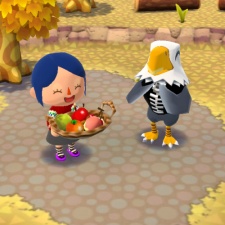Welcome back to the In-App Purchase Inspector – our regular look at free-to-play games from the consumer's perspective.
In each instalment, we consider the incentives or pressure applied to make in-app purchases, their perceived value, the expansion offered by IAPs and the overall value of the experience.
The end goal is to see whether the game makes a good enough case for us to part with our cash, or whether players are content – or engaged enough – to 'freeload'.
This time we're taking a look at Animal Crossing: Pocket Camp, Nintendo's fourth – and arguably most anticipated – mobile release.
It's currently soft-launched in Australia, with a global release set for the end of November.
With the game just around the corner, these impressions are very likely to be indicative of the final version.
Cross carefully
From the minute Nintendo announced its partnership with DeNA to bring its franchises to mobile, Animal Crossing was the one that stood out.
The gentle village sim series lacks the obvious star power of Mario and Zelda, but the manner and rhythm of its gameplay always stood out in Nintendo's stable as being the most suited to free-to-play conversion.
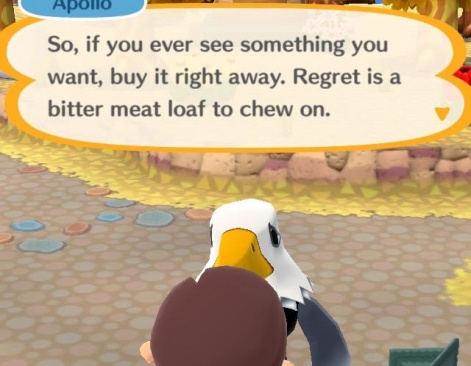
Here was a series whose previous entries had already experimented with having players return regularly over a long period of time, encouraging play patterns we now associate more with free-to-play.
And as for the actual gameplay – designing a home, collecting resources and running errands – it all feels very much at home on mobile.
This is why Pocket Camp didn't require the same fundamental design changes that were required when Mario and Fire Emblem came to mobile, and it's all the better for it.
Happy campers
Nor has the game been meaningfully changed by free-to-play monetisation.
After picking some apples in the early stages and realising it then takes a further three hours for the tree to bear fruit again, some might fear that this is a sign of things to come.
However, the timers are kept to an absolute minimum and, as we've already pointed out, it takes fruit a full 24 hours to regrow in previous, premium Animal Crossing games.
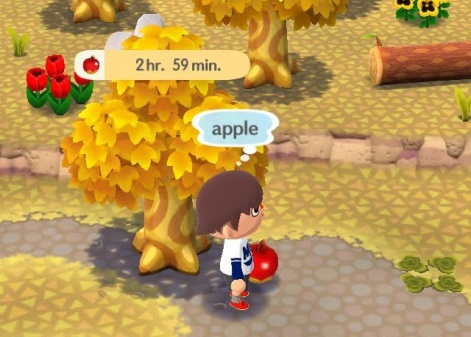
And generally, any worries about Pocket Camp becoming a grindy experience of interminable slowness for non-paying players are very quickly quelled.
The same interactions that always defined Animal Crossing become part of a more formalised, F2P-friendly structure – interacting with animals increases a friendship level, which in turn contributes to an overall levelling system that gives rewards at each increase – but you'd be hard-pressed to find a cynical strain.
Ringing bells
A good supply of Leaf Tickets is ensured by completing objectives.
Pocket Camp has two currencies: long-standing series currency Bells are earned in much the same way as usual, through general play and selling items, while Leaf Tickets are introduced as the game's hard currency.
Leaf Tickets come in bundles ranging from 20 for 1.49 Australian Dollars to 1,200 for A$62.99. A good supply can also be ensured by completing objectives.
As for their actual use, Leaf Tickets come in handy in a few ways. As part of the fishing and bug-catching minigames, for instance, specific nets and honeys can be bought for 15 Tickets apiece to stand a better chance of catching certain species.
There's also a rather good starter pack available for your first 72 hours, featuring 40 Leaf Tickets, two different kinds of fishing net and some honey for A$1.49 – which only gets you 20 Tickets under regular pricing.
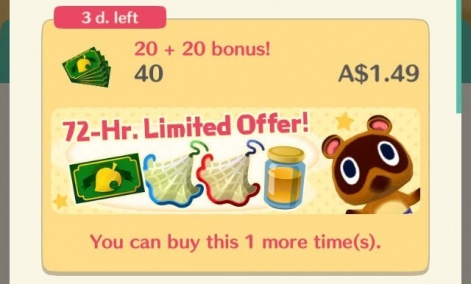
Elsewhere, five Tickets can buy you some Fertilizer to bypass those aforementioned three-hour wait timers and make a tree bear fruit again instantly.
Then there's Shovelstrike Quarry, an area in which high-value minerals and Bells can be mined. It can be entered only once every couple of hours, either for free with a minimum of five other players – one of the game's more explicit social hooks – or in return for 20 Leaf Tickets.
Animal Crossing: Pocket Camp differently frames a kind of gacha system.
Once there, the player gets to choose five rocks to mine, each one containing a different kind of mineral.
With many more than five rocks to choose from and a great variation in the value of the minerals on offer, this is a case of pot luck. While framed differently, it is in effect a kind of gacha system.
The same but different
This isn't the only example of Animal Crossing: Pocket Camp sticking more closely to the F2P playbook than it may initially appear.
Clash of Clans was the game that showed the world the potential in monetising a second builder, by offering the player a chance to effectively double their in-game productivity with a single purchase.
Pocket Camp has a similar system in place when it comes to crafting, where by default only one item can be crafted at any one time. A second slot can be opened up for 80 Leaf Tickets – a larger investment of around five Australian Dollars in real money, but one with a longer-term benefit.
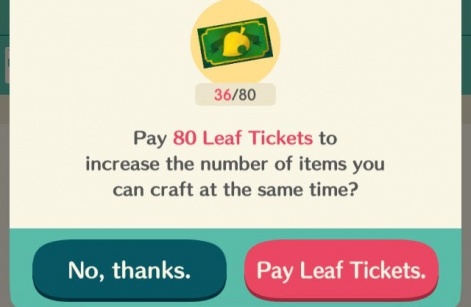
However, games like Clash of Clans wear the player down with long wait timers to the extent that continuing without this purchase feels like a huge slog.
This isn't the case in the early stages here, with most items crafted in a mere one to three minutes, but the game hasn't been available long enough to assess the extent to which this scales up as you progress through the levels.
But all things considered, early impressions suggest that Pocket Camp is Animal Crossing on mobile as the fans wanted: true to the series, and very much at home on mobile, but without bowing to the uglier side of free-to-play.


